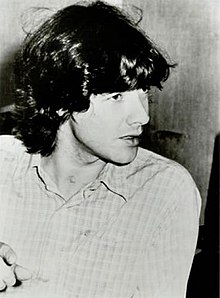Duncan Browne
| Duncan Browne | |
|---|---|

Browne, c. 1979
|
|
| Background information | |
| Born | March 25, 1947 |
| Origin | England |
| Died | May 28, 1993 (aged 46) |
| Genres | |
| Occupation(s) |
|
| Instruments |
|
| Years active | 1967–1993 |
| Labels | |
| Associated acts |
|
Duncan John Browne (25 March 1947 — 28 May 1993) was an English singer-songwriter and musician.
Brown was born on 25 March 1947, the only child of Air Commodore C. D. A. Browne. He initially intended to follow his father into the Royal Air Force but was turned down on health grounds while at the Worksop College. At school he was a promising schoolboy actor and clarinetist.
Browne attended the London Academy of Music and Dramatic Art, studying both music theory and drama. He chose to become a musician when, in 1967, he met Andrew Loog Oldham, and signed with his Immediate Records label. His debut album Give Me Take You was issued in 1968.
His choral arrangement was used on the Tim Hardin penned "Hang On to a Dream" on the album Nice, as recorded by The Nice in 1969.
Browne's biggest hit in the UK was the song "Journey" (UK number 23), and was as televised on Top of the Pops in 1972. The song was included on Browne's second album Duncan Browne in 1973.
In the 1970s, Browne formed the band Metro with Peter Godwin and released some records in the US on the Sire label. He released two solo albums: The Wild Places and Streets of Fire. The song "The Wild Places" was a hit single in the Netherlands. From the same period, "Criminal World", co-written by Browne with Peter Godwin, was recorded by David Bowie on his 1983 Let's Dance album.
...
Wikipedia
